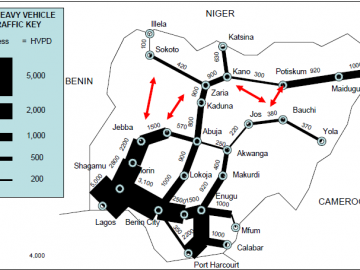Preamble
The government is making vigorous steps in putting in place the required enabling laws to enable private sector participation through the establishment of the Road Funds and the Federal Road Authority. Also government has put in place a regulatory body; Infrastructure Concession Regulatory Commission (ICRC) who in turn had developed a National Policy on Public Private Partnership (PPP) to provide clear and consistent process and procedure guides for all aspects of PPP projects development and implementation. However, a thorough business development plan is a prelude and a necessity.
With the introduction of the Public Procurement Act in 2007, four years after Ghana, Nigeria has made tremendous progress in reducing the level of corruption in the procurement of goods, works and services, thereby translating to a more robust business development in the infrastructure sector of our economy. This is evident, considering the example of Ghana where Public procurement accounts for about 50-70% of imports and about 80% of government expenditure, but regrettably, this area is bedeviled with corrupt practices just like in Nigeria. Because public funds are used to procure goods, works and services, it becomes a big drain on the nation’s coffers if public officers and for that matter individuals misappropriate the funds meant for development.
This paper therefore highlights the role the implementation of the Public Procurement Act, 2007 is playing in improving procurement and business development of Nigeria’s infrastructure.
The Public Procurement Act 2007 (PPA 2007)
Procurement is defined as the process of obtaining services, supplies and equipment in compliance with the applicable laws and regulations. The Public Procurement Act, 2007(PPA 2007) is a legal frame work that ensures uniformity in procurement in Nigeria with the view to achieving Accountability, Competition, Fairness and Value for Money. The Public Procurement Act, 2007 is to streamline public sector procurement of goods, works and services and establish an effective monitoring and tracking system.
There are three categories of Procurement namely:
- Procurement of Goods: This involves the process of purchasing goods of various types e.g. Office equipment, drugs, vehicles, stationeries, etc.
- Procurement of Works: This involves of civil engineering projects e.g. construction of roads & bridges, public buildings, airports, etc.
- Procurement of Services: This may take the form of engaging a company or an individual to perform various services e.g. consultancy services for Technical Advisory Services, road/bridge design, capacity building, etc.
The Public Procurement Act, 2007 also provides for the establishment of National Council on Public Procurement (NCPP) and the Bureau of Public Procurement (BPP) The Council has the Minister of Finance as the Chairman, ten other members, and the Director-General of the Bureau as the Secretary. The functions of the Council include to:
- Consider, approve and amend the monetary and prior review thresholds for the application of the provisions of this Act by procuring entities;
- Consider and approve policies on public procurement;
- Approve the appointment of the Directors of the Bureau;
- Receive and consider, for approval, the audited accounts of the Bureau of Public Procurement, and etc.
The Act established the BPP as the regulatory authority responsible for the monitoring and oversight of Public Procurement, harmonizing the existing Government policies and practices by regulating, setting standards and developing the legal framework and professional capacity for public procurement in Nigeria, and for related matters.
Nigeria’s Business Development Plan
Business development means identifying programs that are available, and determining if you fall within their restrictions. The key to business development is knowing your customers needs and focusing your resources on achieving and exceeding their expectations.
A successful business development plan needs to overcome various obstacles bordering on financial, political, legal, administrative, cultural constraints, as well as corruption, accountability, weak judiciary, contract enforceability, managerial competence, poor IT infrastructure etc. These variables need to be addressed to successfully implement any business development plan, particularly for a PPP model in Nigeria. An ideal business development to improve infrastructure has two interrelated components:
- the psychology of creative procurement strategy, and
- the organizational encouragement and promotion of new business development ideas.
- As with all successful businesses, the key to performance and profit is a good understanding and knowledge of the procurement systems.
It is our intention in Nigeria to bring rapid development to her infrastructure, particularly the roads sector, through the procurement of services and works, which will help, tremendously in the provision of infrastructure that will bring about the desired development level, the government has been encouraging international investors, contractors, and other suppliers in the Nigerian market for infrastructure services. It is known worldwide that a country’s procurement system is the only avenue that can connect business with the resources and information for business development. Therefore, it can be concluded that the primary assessment for infrastructure development in our country is a central resource for technology, products, services, information, and management strategies that support business development and continuity, that will safeguard the physical, informational, and communication assets of a business; ensure the safety of employees and the public; and protect the financial well-being of the country.
The case of Nigeria, in addition to the above positive indicators, and existing fiscal policies (tax holidays, accelerated tax depreciation and low company tax etc) to encourage investment, the government could still do well to: advance take off grants to induce private investment, ring-fence cash flow from PPP-related projects for use to service project obligations, ensure that private sector are allowed to charge economic rates and review property ownership rights for adequate protection of PPP-related projects.
A notable assistance to business development, regarding procurement is the recent government policy to advertise its major projects through international and local media such as, the World Bank UN Business Development database, the BPP’s website, the Nigerian press, and other websites, to inform potential bidders of its requirements. These Procurement Services help vendors access the information for any indicated business formation, and particularly increase and encourage the participation of the International Business Community. However, there is need to encourage business development benchmarking exercise on procurement, to quantify the variability in prices paid for infrastructure development. The aim is to:
- Examine and understand the drivers of price variation across a fixed number of infrastructure projects;
- Provide the price transparency that is needed for the private sector to negotiate the market effectively; and
- Facilitate empirically-based peer-to-peer discussions on common challenges, best practice, and how to improve procurement efficiency.
There are various methods of procurement, usually taken into considerations at various stages of a business development can be broadly classified under the following headings:
- Traditional
- Design and Build
- Two Stage Tendering
- Public Private Partnerships / Private Finance Initiative
- Management Contracting
- Construction Management
- Framework Agreements
The public sector responsible for the management of the road infrastructure need an objective, credible and systematized procurement framework for tracking and monitoring the quality of the business environment they create. On the other hand, the private sector and civil society need good independently researched evidence for dialogue and engagement with government, particularly in business development plan. Investors and company managers need regular trusted updates of business environment data to guide their management and investment decisions.
Also critical to the success of any business development, particularly for road infrastructure, is the development of contracting and transaction capacity in the public sector. The process of achieving this requires that at each stage/level, the requisite expertise or technical and managerial capacity is available. Capacity for budgetary, legal and regulatory frame work must be instituted with sufficient expertise for handling relevant issues like procedure for selecting bids, security etc. Also vital is establishing a set of competencies for managing the procurement process, for example, PPP, which includes an understanding of the various stages in the procurement process and the establishment of a ‘bid evaluation team structure with a good management approach to ensure due process to all stakeholders.
From the foregoing, the prospective private investor/contractor needs to work directly with the government in preparing a Business Development Plan that serves as a blueprint for how involvement into road infrastructure development can be sustainable in the medium to long term. The Plan should include the objectives of the client, the government, the strategy to achieve the objectives, and the resources required (human, financial and administrative infrastructure); this may involve review of the government current procurement legislation. Any business development plan should set out in a clear and concise manner, a work plan for a project, and identify individual roles and responsibilities with milestones for delivery.
The benefits of the above are enormous, particularly; it will increase the pressure for greater public accountability in providing business environment for infrastructure development and provides governments unified research-based peer review framework in an ongoing manner. In achieving this proposal, the government should conduct an inventory of the sector to establish the factors that are inhibiting growth or new entrants to the market; and conduct a survey of existing Business Development Services to assess the consumption and potential demand of services by the contractors. There is also the need to advice on areas for institutional support and capacity building for the road infrastructure development area, particularly, the review of the impact of existing legislation and other regulations on informal, micro and small businesses, as well as reviewing existing policy frameworks. With these benefits, players in the infrastructure sector are to take advantage of the vast opportunities available in Nigeria to participate in our infrastructure development.
Conclusion
The conclusions made in this paper are as follows:
- The development of the road infrastructure network in any country is inimical to the overall social and economic development of the country.
- The objectives of a well-developed infrastructure base will be achieved through the optimization of available resources, deliberate changes in the conception and methods of execution of procurements of projects following all due process requirements.
- To obtain maximum results, all stake-holders will be fully mobilized to play a role in the provision of resources, adoption of new policies, monitoring etc.
- Business development will be pursued to properly re-orientate the Contractor to be up to date in facing these new challenges.
- To realize the goals of the private sector, they should be fully responsible for execution of the various programmes related to procurement in a particular domain.
On the part of government, its key responsibilities remain the following: Maintain political commitment and build capacity; Develop framework for prioritizing; Gather and disseminate information; Ensure value for money for the tax payer; Manage and influence public opinion; Encourage the development of deep and innovative capital markets; Develop appropriate legal and regulatory framework; Maintain economic and political stability; and Promote value for money audits of signed projects.



